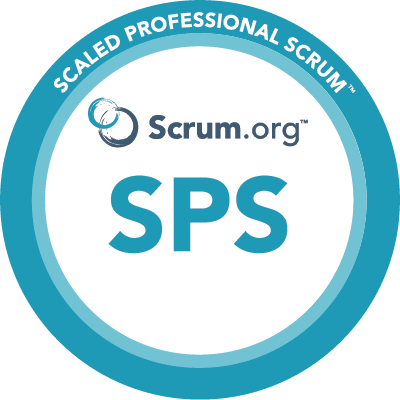Scaled Professional Scrum (SPS) Certification: Mastering Agile at Scale

Introduction to the SPS Certification
Overview
The Scaled Professional Scrum (SPS) certification from Scrum.org focuses on applying Scrum effectively in large, complex projects that require coordination across multiple teams. It is built around the Nexus™ framework, which extends the Scrum framework to handle the complexity of scaling Scrum with multiple teams working on the same product.
The goal of the SPS certification is to equip professionals with the skills needed to manage dependencies, integration challenges, and cross-team collaboration in large-scale Scrum environments. The SPS certification is highly relevant for organizations looking to implement Agile at scale in a way that preserves Scrum values and continuous improvement.

Key Facts
- Launch Date: The SPS certification was launched by Scrum.org in 2015.
- Certified Professionals: By 2023, more than 10,000 professionals worldwide have earned the SPS certification.
- Founder: The SPS course and Nexus framework were developed by Ken Schwaber, co-creator of Scrum, to meet the increasing demand for scaled Agile frameworks.
Target Audience
The SPS certification is ideal for:
- Scrum Masters, Product Owners, and Developers who are working on projects involving multiple Scrum teams.
- Agile coaches and consultants who guide large-scale Scrum implementations.
- Managers and leaders who need to support or lead enterprise-level Agile transformations.
Certification Objectives and Learning Outcomes
Core Learning Objectives
The primary learning objectives of the SPS certification include:
- Mastering the Nexus™ framework, which is an extension of Scrum designed for scaling Agile across multiple teams.
- Learning how to manage dependencies and interactions between multiple Scrum teams to deliver a single integrated product increment.
- Developing strategies to minimize integration issues and maintain transparency across teams.
- Understanding how to implement Scrum at scale while preserving Agile principles such as continuous delivery and cross-team collaboration.
Skills and Knowledge Gained
After completing the SPS certification, professionals will:
- Understand how to coordinate up to 9 Scrum teams working on a shared product backlog.
- Be able to use Nexus Integration Teams to ensure that work is aligned and integrated effectively across teams.
- Know how to identify and manage dependencies, address bottlenecks, and resolve integration issues that typically arise in large-scale Scrum implementations.

Benefits to Professionals
- Career Advancement: SPS-certified professionals are well-positioned to take on roles such as Agile Coach, Scrum Master for multiple teams, or Scaled Agile Consultant.
- Employability: As more organizations adopt Agile at scale, demand for professionals who can manage complex, multi-team environments is growing.
- Leadership: Professionals gain the skills to lead large-scale Agile transformations and ensure that teams can deliver at scale without sacrificing agility or quality.
Detailed Breakdown of the Certification Process

- Pre-requisites: There are no formal prerequisites, but it is highly recommended that candidates have experience with Scrum and a good understanding of Scrum principles. Experience as a Scrum Master or Product Owner is an advantage.
- Training Requirements: The Scaled Professional Scrum (SPS) workshop is a two-day course that covers the Nexus framework in detail. It includes interactive exercises to help participants practice scaling Scrum with multiple teams working on a single product backlog.
- Exam Format:
- Number of Questions: 40 questions (multiple-choice, multiple-answer).
- Time Limit: 60 minutes.
- Passing Score: 85%.
- Retake Policy: Candidates can retake the exam by purchasing another attempt after a failed attempt. There are no limits on retakes.
- Certification Levels: SPS is a single-level certification, focused on scaling Scrum using the Nexus framework. Professionals can further expand their skills by pursuing other certifications like Professional Scrum Master (PSM) or Professional Scrum Product Owner (PSPO).
- Recertification: The SPS certification is valid for life, with no need for recertification.
Key Benefits of the Certification for Organizations
Impact on Teams and Organizations
SPS certification is invaluable for organizations that need to scale Scrum across multiple teams working on complex projects. Benefits include:
- Improved cross-team collaboration: Nexus provides a structured approach for coordinating teams working on a shared product backlog.
- Better integration and faster delivery: SPS helps organizations manage dependencies and ensure that multiple Scrum teams can work in sync, delivering integrated product increments efficiently.
- Scalability without losing agility: With Nexus, organizations can scale their Agile practices while maintaining the flexibility and iterative nature of Scrum.
Real-World Application
Large organizations such as Amazon and BMW have successfully used the Nexus framework to scale their Agile practices. By implementing Nexus, they managed to streamline cross-team collaboration and reduce the time-to-market for complex, multi-team projects.

Industry Recognition
The SPS certification is recognized globally, with leading organizations such as Google, Intel, and Microsoft prioritizing the certification when hiring professionals to manage scaled Agile projects.
Case Studies
At Spotify, the SPS framework was used to integrate work across multiple Agile teams, resulting in a 25% improvement in delivery speed and a reduction in integration issues during the product release cycle. Similarly, Siemens applied SPS principles to manage dependencies across five Scrum teams, leading to better alignment and more efficient product development.
Certification Costs and Value Proposition

Cost of Certification
The cost of the SPS exam is approximately $200. The optional two-day SPS workshop typically costs between $1,000 and $1,500, depending on the provider and location.
Return on Investment (ROI)
For professionals, the SPS certification can lead to an increase in salary by as much as 15-20%, especially for those who are taking on leadership roles in Scaled Agile transformations. For organizations, the investment in training and certification often results in improved team performance, reduced integration issues, and more efficient product delivery at scale.
Financial Aid and Discounts
Scrum.org offers group discounts for organizations looking to certify multiple employees. Some training providers may also offer early bird discounts for participants who register in advance.
Comparison with Other Certifications
Competitor Analysis
The SPS certification is often compared with other scaled Agile certifications such as SAFe Agilist by Scaled Agile Framework (SAFe) and LeSS (Large-Scale Scrum). While SAFe Agilist focuses on enterprise-level scaling with a heavier focus on project and portfolio management, SPS is more aligned with pure Scrum principles and emphasizes the use of the Nexus framework for scaling Scrum. LeSS, on the other hand, is another framework that also focuses on scaling Scrum but differs in its approach to coordination across teams.
Unique Features
- Nexus Framework: SPS is built around Nexus, which is lightweight and easy to implement for teams already familiar with Scrum.
- Focus on integration: Nexus emphasizes cross-team integration, making it highly effective for reducing integration problems and ensuring that teams are working towards the same product goals.

Industry Trends
As more organizations adopt Agile at scale, there is an increasing demand for certifications like SPS that focus on coordination and integration across multiple teams. The focus on Agile leadership and cross-team collaboration makes SPS particularly relevant in industries like technology, finance, and automotive, where large-scale projects often involve multiple Agile teams.
Success Stories and Testimonials

Case Studies
At ING, the implementation of SPS led to improved alignment between teams, resulting in faster delivery times for large-scale projects. The use of the Nexus framework helped reduce integration challenges, allowing the organization to release new features more frequently and reliably.
Personal Success
David Martin, an Agile Coach at IBM, shared his experience: « The SPS certification helped me scale Scrum across multiple teams. Nexus gave us the tools to manage dependencies efficiently, and as a result, we improved our delivery speed and reduced bottlenecks in the process. »
Notable Companies
Organizations like Tesla, Spotify, and BMW actively encourage SPS certification for key leadership roles to ensure they have professionals who can manage cross-team coordination and lead large-scale Agile initiatives.
The Future of Agile and This Certification
Emerging Trends
As organizations continue to adopt remote work and face increasingly complex development environments, the need for Agile at scale continues to grow. Certifications like SPS, which focus on cross-team collaboration and integration, will be essential for ensuring that large Agile teams can deliver high-quality products in distributed settings.
Future Updates to the Certification
Scrum.org regularly updates its certification offerings to stay aligned with industry trends. Future updates to SPS may focus on advanced Nexus techniques for handling remote teams, AI-driven project management, and the integration of DevOps practices into scaled Scrum environments.
Relevance in a Changing Market
With the increasing complexity of product development, the ability to scale Scrum efficiently is critical for organizations looking to maintain their Agile advantage. The SPS certification remains highly relevant, as it provides the framework for managing large-scalemarket dynamics while ensuring that Agile teams can coordinate across multiple Scrum teams effectively.

Conclusion
In conclusion, the Scaled Professional Scrum (SPS) certification is a powerful tool for professionals and organizations seeking to implement Agile at scale using the Nexus framework. As industries evolve and projects become increasingly complex, this certification ensures that teams can maintain Agile principles while scaling effectively, making it a valuable asset in today’s fast-paced, technology-driven environments.